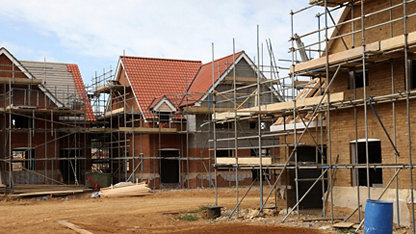Programme for Government
Yesterday, the Scottish Government published its Programme for Government in full, following the signing of a cooperation agreement with the Scottish Green Party just over two weeks prior.
Among the high-level calls to prioritise the post-COVID recovery and work towards an independence referendum by the end of 2023, the Programme reiterates a number of policies relevant to RICS members that have been widely socialised through the cooperation agreement and prior manifestos.
Of the immediate Bills to be introduced over the coming 12 months, the Non-Domestic Rates COVID-19 Appeals Bill is most pertinent. But over the coming Parliamentary term, there is an ambitious policy agenda which touches on various aspects of the surveying profession. This includes the development of a Construction Recovery Plan, ambitious home building targets, funding programmes for home energy efficiency improvements, a land reform agenda, the planned modernisation of compulsory purchase, and – following the Green Party agreement – the ambition to introduce rent controls by the end of the Parliament.
An in-depth look at the SNP-Green Party cooperation agreement and what it means for the built and natural environment
The Shared Programme between the Scottish Government and Scottish Green Party, entitled Working together to build a greener, fairer, independent Scotland falls just short of a full formal coalition but looks and acts like one in many ways, with two Green MSPs – Patrick Harvie and Lorna Slater – becoming junior ministers.
What does the agreement mean for the built and natural environment?
As expected, the document sets out a progressive policy agenda, touching on various areas relevant to RICS and the membership. Also, as would be expected in such an agreement between these two parties, there is a clear focus on addressing social and environmental issues across various sectors of the economy. The key question is whether policy implementation can match policy ambition.
- Economy: The SNP has always been relatively split on its broad economic agenda. In 2007, it occupied a centre-right pro-business position, but it has gradually drifted left over recent years. It has difficult questions to answer over the economic case for independence, and recent reports and recommendations on the future of the Scottish economy have attempted to straddle this divide. Regardless, it is clear that the Just Transition to Net Zero will be at the forefront of its cross-sectoral approach to the economy over the coming Parliament.
- Policies: Consult on requiring annual disclosures from large businesses on how climate change will impact their business, and the role of Just Transition Plans; Deliver National Strategy for Economic Transformation to be published by late Autumn 2021.
- Housing: It is within the housing space that the SNP-Green proposals are at their boldest, particularly regarding calls for a new system of rent controls. Green MSP Patrick Harvie was particularly proud of securing this in the negotiated agreement.
- Policies: Create a new housing regulator for the private rented sector and a new sector strategy by the end of 2021; Introduce new rights for tenants; Implement a national system of rent controls; Deliver 110,000 affordable homes by 2032, with 70% available for social rent.
- Green Buildings: Improving the green credentials of new and existing buildings is a key tenet of Scotland’s ambitions to achieve net zero by 2045, and there is a significant body of work underway as part of the new proposed Heat in Buildings strategy. However, there remains a significant gap between the ambitious targets and the exact regulations and actions needed to reach such targets. RICS is helping to provide the expertise and experience to make this transition possible.
- Policies: Phase out installation of new or replacement fossil fuel boilers in off-gas from 2025 and in on-gas areas from 2030; Introduce primary legislation providing the regulatory framework for zero emissions heating and energy efficiency; Decarbonise all publicly owned buildings by 2038; Invest at least £1.8bn over coming Parliamentary session to accelerate energy efficiency and renewable heating projects.
- Planning & Land Reform: The Scottish Government has ambitious goals for its planning and land reform agenda, which could see a significant shift from market to public-sector-led place-making, with far greater input from local communities. There are numerous forward-thinking proposals and the opportunities to improve the liveability of local areas are vast, but it is a significant undertaking. It is also crucial that the increased role given to local voices do not get in the way of necessary development activity.
- Policies: Embed concept of 20-minute neighbourhoods; Enable and promote renewable energy development in planning reforms; Prioritise bringing vacant and derelict land and property back into productive use; Introduce Land Reform Bill by end of 2023; Public interest test on land transfers to tackle concentration of land ownership; Double Scottish Land Fund.
- Transport & Energy: One area where there is continued disagreement between the SNP and Scottish Greens is transport and energy. From the SNP’s non-committal statements on the Cambo oil field, to the Greens’ reticence towards improvements to the road network for fear of encouraging greater car use, there are certainly some issues here that could test the overall relationship between the two parties. That being said, there is a clear shared ambition to increase renewable energy production and improve public transport networks.
- Policies: Deliver between 8 and 12 GW of installed onshore wind by 2030; Create a ten-year £500m Just Transition Fund for the North East and Moray; Deliver a new Climate Change Plan; Align National Planning Framework 4 with renewable energy ambitions; Align transport policy with climate targets and the goal of reducing car/km by 20% by 2030; Invest over £5 billion in maintaining, improving and decarbonising Scotland’s rail network.
What does the agreement mean for independence?
Despite the agreement committing to hold a referendum on Scottish independence within the next five years, and preferably by the end of 2023 as set out in the Programme for Government, it does little to shift the politics of the situation. There was already a pro-independence majority in the Scottish Parliament, and the Green Party would have supported any attempt by the SNP administration to progress its plans for a referendum.
The real sticking points to holding a second referendum were always external. Firstly, the Prime Minister remains resolutely opposed to permitting the Section 30 order required to hold an official referendum, and the SNP’s failure to secure an outright majority in May bolstered this position. Secondly, and more importantly, is the inability of the pro-independence campaign to shift voter intention polling above 50% in support of independence. Indeed, the majority of polls held since mid-April has seen the pro-UK side ahead, marking a significant change from the latter half of 2020.
Why did both parties wish to secure such an agreement?
- Stability: Despite being the biggest Party between 2016 and 2021 by some margin, the SNP faced a number of testing Parliamentary situations, particularly around the threat of no confidence votes against then Education Secretary John Swinney. The agreement gives the SNP the assurance of knowing it can rely on the votes of the Scottish Green Party over the coming Parliamentary term.
- Sustainability: With Glasgow’s hosting of COP26 fast approaching, the agreement allows the Scottish Government to bolster its green and sustainability credentials, working alongside the Greens and putting forward an ambitious policy agenda, where sustainability cuts across numerous policy briefs.
- Influence: From the Greens’ perspective, the agreement gives the Party its first route into national government across the UK. The Greens have arguably long been an influential mainstay of UK politics, but it will be interesting to see how the Party fares with the murkier world of compromise and governance. The Scottish Government’s decision to introduce vaccine passports has already caused the Green’s some difficulties.












